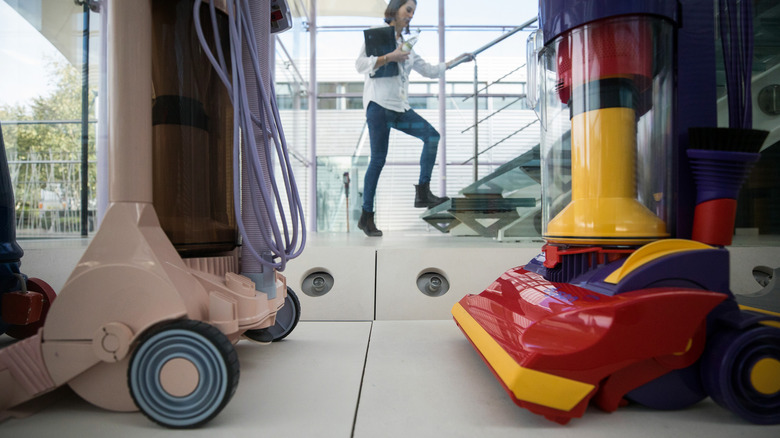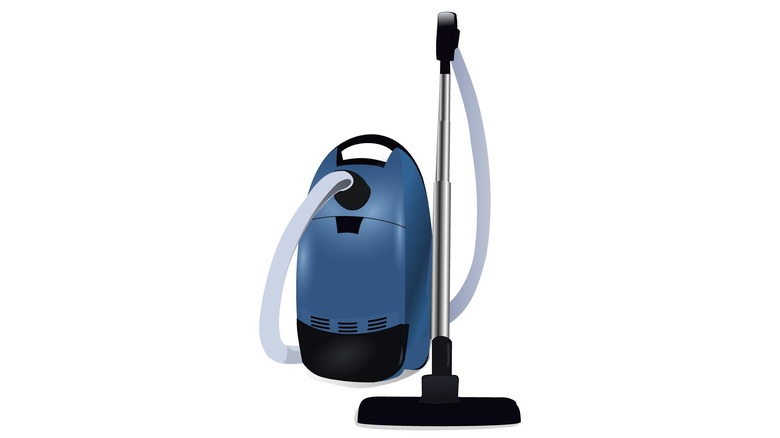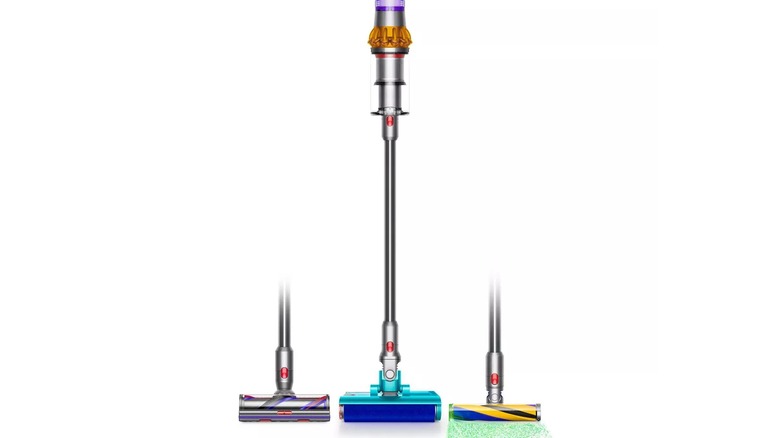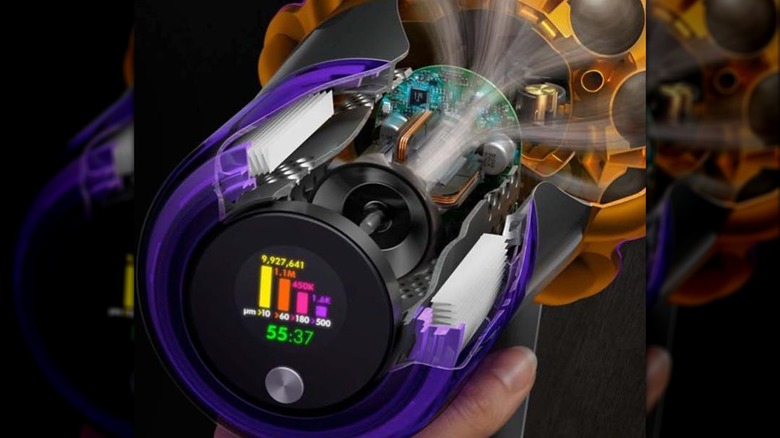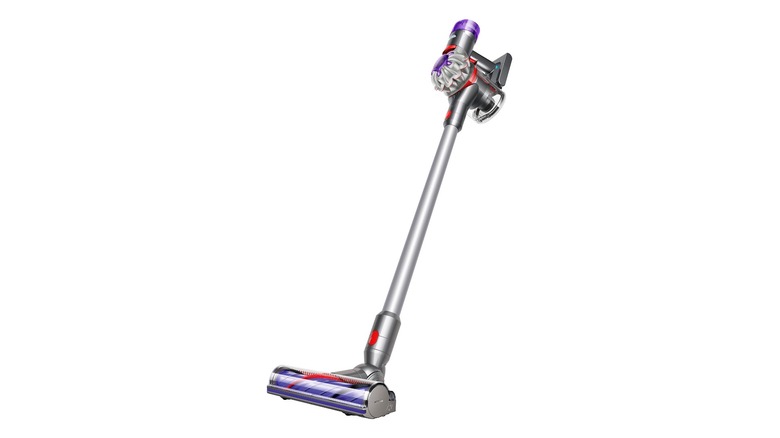Is It Worth It? What To Know About Dyson's Vacuums Before You Buy
We may receive a commission on purchases made from links.
These days, with its distinct design buoyed by a legacy of equally unique TV commercials, Dyson is probably the most recognizable vacuum cleaner brand in the world. At least in the United States, the company made its name on the back of commercials that started airing in October 2003 and stressed Dyson's distinct bagless design, which the ads claimed made it the only vacuum that never loses suction. In the two decades since, Dyson has become a powerhouse, with a wide-ranging line of vacuum cleaners and other small home appliances, eventually becoming the biggest vacuum cleaner brand in the U.S. by market share.
If you're in the market for a Dyson vacuum, though, it's worth it to educate yourself as a consumer first. Dyson's products are on the expensive side, so it's best to learn if they're right for you, what differentiates them from the competition as well as each other, and complaints that have come up about them, among other things.
Do you even need a Dyson?
Dyson's vacuum cleaners tend to be pretty expensive, and not everyone needs even a pricey non-Dyson vacuum cleaner. If you don't have carpeted floors, then vacuuming is less necessary in the first place, especially if you don't have pets or upholstered furniture. No carpeting or upholstery means that you don't have a massive forest of comfy fibers where dust can make itself at home.
That said, you can still make use of a vacuum cleaner under those circumstances; it just doesn't have to be a Dyson. Hand vacs, also commonly referred to using the "Dustbuster" name that Black and Decker popularized, are a useful and relatively inexpensive option. For full-sized vacuum cleaners, it's best to find something recommended for your flooring type. For example, It's best to go with something with removable brushes if you're mainly vacuuming hardwood floors.
Checking out WireCutter's article about the best hardwood vacuums perfectly illustrates how expensive Dysons are: More than three times the price of their main pick from Shark, about two times the price of their upgrade pick from Miele, and roughly 15 times the price of their budget pick from Bissell. Whether or not a Dyson might be best for you comes down to specific use cases. If you really need a high-power cordless stick vacuum for your hardwood floors, then it may be worth the steep price. In general? Research your specific needs.
Cordless Dysons have a much shorter warranty
The more expensive the item, the more it should come backed by solid customer service and a respectable warranty. Apple's prices, for example, can be easier to digest when you know you can go to a nearby Apple Store for repairs, especially if you live in a major metropolitan area. If you're paying for a brand name, part of that is peace of mind over not just build quality but also how much the manufacturer will back the item if something does go wrong.
Dyson is pretty upfront about its warranty terms, which is good, but they get less attractive if you're specifically eyeing a cordless model. Dyson's big draws include lightweight, convenient, easy-to-use vacuums that require relatively minimal effort to operate, but Dyson's two-year warranty for cordless vacuums is just not as compelling as the five-year warranty for its corded vacuums. For a particularly expensive, showy, premium brand, it's honestly pretty underwhelming.
Figure out what features you need
Dyson has a wide array of vacuum cleaners of different shapes and sizes at various premium price points and with all sorts of differing features. As you go up in price, new options become available. Besides the aforementioned basics, like what kind of flooring a given vacuum is best for, what type of warranty you want, and how lightweight/maneuverable a machine you want, plenty of extra bells and whistles might weigh in on your purchasing decision. Some Dyson vacuums add features like illumination of the area in front of the vacuum, better filtration, a display that explains numerically what the vacuum is picking up, and vacuums that also wash your bare floors.
Thankfully, Dyson has a tool on its website that asks you which features are most important to you and then narrows down the best choice for you as well as some alternative options. If you're set on getting a Dyson but aren't sure which one is best suited to your needs, then this is the easiest possible way to figure it out.
Consumer Reports has lost faith in them
Consumer Reports, a nonprofit publication that started in 1936, has long been trusted for its unflinchingly honest and unbiased consumer goods reviews. So when they go back on a recommendation, people tend to listen.
In March 2019, Consumer Reports removed all Dyson models from its list of recommended stick vacuums, where some had been mainstays for years, due to concerns over build quality and reliability. Based on projections made from reader survey data, it was estimated that "close to half of Dyson stick vacuums will develop problems or break within five years, compared with around a quarter of the stick vacuums from Shark, the most reliable brand for this type." That translated to a 2 out of 10 rating in Consumer Reports' "predicted reliability" category, which the magazine classifies as "poor." Consumer Reports upheld its recommendations for Dyson's canister and upright vacuums, which did much better than the stick models in the magazine's reliability projections.
"Dyson goes to the limit to create machines that perform exceptionally, are delightful to use, and last a long time," a Dyson spokesperson told Consumer Reports. "Our rigorous testing, owner surveys, and years of performance differ from the reliability predictions made by Consumer Reports. We will never stop learning and working to do right by our owners." The most common issues were battery failure, brush malfunctions (at a rate "significantly higher" than that of competitors), suction and power switch issues, and the vacuums breaking completely.
There's a class action lawsuit over warranty terms
Remember that warranty? As of this writing, there's an ongoing class-action lawsuit against Dyson alleging that some of the terms of the company's warranty are unlawful. According to an amended complaint filed in September 2023, Dyson voids the warranty of customers who try to repair their vacuums on their own before sending them in for service, which the plaintiffs assert is illegal under the Magnuson-Moss Warranty Act.
"No warrantor may condition the continued validity of a warranty on the use of only authorized repair service and/or authorized replacement parts for non-warranty service and maintenance," reads a Federal Trade Commission rule cited by the amended complaint. "For example, provisions such as, 'This warranty is void if service is performed by anyone other than an authorized [brand name] dealer and all replacement parts must be genuine [brand name] parts,' and the like, are prohibited where the service or parts are not covered by the warranty."
As of this writing, Dyson has not yet formally answered the amended complaint but previously tried to get the case dismissed for failure to state a claim based on the original complaint from a few months earlier.
